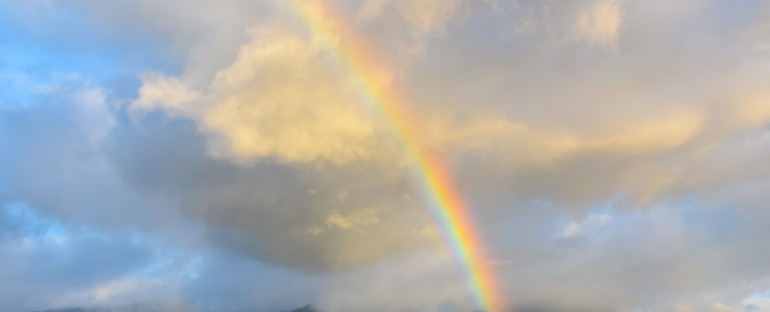We know so much and yet we still don’t know how to live in peace with each other and our planet. Rather than acquiring more knowledge, more beliefs, what is needed is a transformation of consciousness, a shift in how we view ourselves and our world. Maybe stepping outside of our limited idea of ourselves and contemplating the mysteries of the Universe can help us recognize the vastness, the unfathomable nature of all that is. Maybe contemplating the unknowable can give us a sense of reverence and gratitude for our very existence. And maybe then we can recognize our oneness with our fellow humans and learn to live together in harmony.
Recently, I read a quote by Robert Frost about his friend, poet John Keats. “Keats mourned that the rainbow, which as a boy had been for him a magic thing, had lost it’s glory because the physicists had found it resulted from the refraction of the sunlight by raindrops…”
Life can lose its magic for us as we grow up and discover that science has unraveled many of the mysteries of the physical world. We can ask Google or Alexa almost anything. There are countless YouTubes explaining everything you could ever want to know about the universe, including questions you never thought to ask. What was there before the Big Bang? Does time exist? Is the universe infinite? Are there multiple universes? But just because we know the scientific answers to these questions (or theories about them) doesn’t mean there is no mystery involved. The more deeply we question, the less realize we know. Einstein wrote, “Try and penetrate with our limited means the secrets of nature and you will find…there remains something subtle, intangible, and inexplicable.” He said there is a “force beyond anything we can comprehend…”
Knowing that rainbows are formed from sunlight and raindrops doesn’t mean we know what determined the laws of nature that allowed the rainbow to exist, or how the Universe, which contains the rainbow and everything else, appeared in the particular form it has. And what about us humans? How did we appear on Earth with the consciousness to ask these questions?
The underlying mystery of life will never be solved by science or explained by Alexa. The deeper we delve into these mysteries, the more we realize they can’t be solved by the intellect. Even Einstein recognized this: “The most beautiful thing we can experience is the mysterious. It is the source of all true art and science. He to whom the emotion is a stranger, who can no longer pause to wonder and stand wrapped in awe is as good as dead…”
We figured out through science and technology how to get to the Moon, but the men who traveled there didn’t lose their sense of wonder as they viewed our planet from space or stepped foot on the Moon’s surface. In fact, they reported it was a life-changing experience that deepened their appreciation for the mystery of life. Edgar Mitchell wrote: “We went to the Moon as technicians; we returned as humanitarians.” He also said, “My view of the planet was a glimpse of divinity.” These were engineers and other men of science who came back to Earth profoundly transformed by the mystery that science can never unlock.
Years ago, when I was just beginning my career as a psychotherapist, I worked with a client I will never forget. Although he was dying of HIV/AIDS and his body was worn and ragged, he carried an aura of peace and contentment. I asked him how he coped with his illness and the knowledge of his impending death. His answer—not just his words, but the energy behind them—was profound. He said that he was at peace, that he had learned, since his diagnosis, to appreciate his life, to understand that each day, each moment was a precious gift. His only regret was that he had not realized this sooner.
There are lessons we can learn from children, and from the dying—both are present here and now. Knowing this life is impermanent, can we recognize the magic in each moment? Can we look with the eyes of our child nature, before we became so wise, and begin to see life as an enchanting mystery? And when we do, can we really hate our fellow humans?
CONSIDER THIS: Can you “pause to wonder and stand wrapped in awe” with the innocence of a child?
Recent Posts
Recent Comments
- Terry Scott on CONTEMPLATING THE UNKNOWABLE
- Irene Kokatay on THE PATH OF SELF-KNOWLEDGE
- Terry on THE PATH OF SELF-KNOWLEDGE
- Irene Kokatay on LIVING IN INFINITY
- Terry Scott on LIVING IN INFINITY





One Response to CONTEMPLATING THE UNKNOWABLE